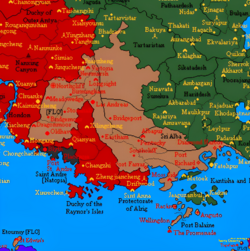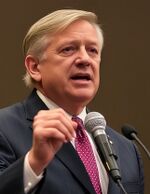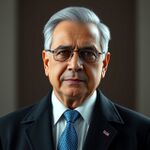Confederate States of Floria
| The Confederate States of Floria | |||
| |||
| Motto: "Peace through strength and peace through song" | |||
| Anthem: Eternal Star of Unity | |||

| |||
| Map versions | Present | ||
| Capital | Northcliff | ||
| Largest city | Northcliff
| ||
| Official language(s) | * New Florian;
Istvanistani
| ||
| Official religion(s) | Widely practiced: | ||
| Demonym | Florian | ||
| - Adjective | Florian | ||
| Government | Federal presidential republic | ||
| - President | Ronald Trueman Jr. | ||
| - Legislature | The Confederate States of Floria Congress | ||
| Establishment | 1647 AN.13 | ||
| Area | 5,058,144 Km2 | ||
| Population | 150,273,210 (1739 AN) | ||
| Active population | 1 citizen | ||
| Currency | Florian Dollar ($) | ||
| Calendar | |||
| Time zone(s) | CMT-2 to 0 | ||
| Mains electricity | |||
| Driving side | Right | ||
| Track gauge | |||
| National website | GOV.FLO | ||
| National forum | Official Discord | ||
| National animal | Bear | ||
| National food | |||
| National drink | |||
| National tree | |||
| Abbreviation | FLO | ||
The Confederate States of Floria, commonly known as Floria, is a nation in Central Southern Apollonia. Its thirteen states and three territories have a total population of over 150 million people in an area of 5,058,144 Km2 stretching from its eastern border with Shireroth to the border with Çakaristan in the north and east. To the south, Floria borders the North Raynor Sea and the Gulf of Esgality. The capital of Floria is Northcliff, with other significant metropolitan areas including Oldhaven, Dragonmoor, Newmarsh, and Stonehall.
As a whole, the Confederate States is densely populated and most of the land in Floria is either dominated by tropical rainforest or desert, particularly in the country's northern parts. Its population is highly urbanised with 85% of its inhabitants living in large or medium-sized cities. Despite this Floria is the fourth largest nation by population in Apollonia and 8th globally by that measure. Before the inhabitation of the modern-day Florian, the area of what now is the Confederate States of Floria was inhabited by ethnic Jingdaoese however, these Jingdaoese aboriginals were eventually driven out of the area and returned to the mainland. In the 1650s Floria was responsible for a devastating global conflict after an alleged hired assassination of Nikolaj I of Coria eventually triggering an all-out war between the USSO and SANE. This left Floria in devastating ruin and with heavy sanctions. However, it soon recovered and has since become a global financial hotbed.
The Confederate States of Floria is a federal republic. Previously a parliamentary republic, its citizens 'elect' both the President and Congress annually, according to the calendar of 12 AN years. Officially trilingual at the federal level, Floria ranks highly in international metrics for civil liberties, quality of life, economic freedom, and education.
Floria is known for its multicultural and ethnically diverse population and maintains a nuanced relationship with its neighbour, Shireroth. The national government operates as a presidential constitutional federal republic and liberal democracy, structured with three distinct branches: legislative, executive, and judicial. The legislative branch consists of a bicameral system with the House of Representatives, which allocates seats based on population, and the Senate, offering equal representation for each state.
Since 1695, the political landscape has been dominated by the Social Democratic and United Republican parties.
A highly developed and potential Superpower on Micras, the Confederate States has a high GDP per capita and a large and advanced economy with one of the strongest currencies in the world. It offers healthy levels of social security and a universal health care system, environmental protection, and free university education. The Confederate States of Floria, then known as the Florian Republic were former members of the Apollonian and Euran Economic Union, the Raspur Pact and USSO before withdrawing from the three organisations.
History
Jingdaoese Period
Establishment
Following Jingdao’s evacuation of the majority of modern-day territory, Floria emerged. The Florian people, who coexisted with the Jing who remained behind, opted for unity after observing the advantages of combined settlements over autonomous ones, a practice prevalent in previous decades. Subsequently, they expanded southward, reaching the southern coast and establishing the city of Blythe. Their expansion also extended eastward. However, this transition was not without challenges. Notably, shortly after the establishment of the new government, the Jing-dominated region of Xhusor rebelled, sparking the Xhusor War.
Shirerithian era
Floria was a Shirerithian protectorate, known as the Florian Republic, from 1653 to 1656. The Florian Republic became a Shirerithian protectorate after Shirerithian diplomats persuaded then-president Edwin Farrar to have the Florian Republic withdraw from the Union of States around the Sovereign Oceans (USSO) and join the Shirerithian sphere of influence. Following Farrar’s loss of the presidency, his successor, Džesika Jovanović-Smičić, aligned with Jingdao, triggering Article 3.2 of the Florian association treaty, which resulted in the Florian exit from Shireroth in early 1656.
During the protectorate, the Shirerithian government was represented by a powerful Imperial High Commission in Northcliff, headed by Juana Beazcoetxea (later known as Viscountess Dragonmoor). The Imperial High Commission had its own courts, police force, and other administrative functions. Shirerithian control extended to the Florian Security Forces, the Provisional Court of Justice of the Florian Republic, the Florian Revenue Authority, and the Chamber of Prosecutors in the Florian Republic. The Shirerithian government had the intention of integrating Floria into the Shirerithian imperial republic. To this end, the president of Floria was also ex officio a member of the Landsraad. Notably, Džesika Jovanović-Smičić, Floria’s president, even stood for election as Steward of Shireroth in 1654 but was defeated by Waldemar Zinkgraven.
Following the conclusion of the War of Lost Brothers, the southernmost region of the protectorate was voluntarily ceded to Natopia in accordance with the wishes of the local populace. This territory subsequently became known as the Florian Free State.
Emergence of power and the War of Lost Brothers
The War of Jingdaoese Immolation led to a significant military buildup among major Micrasian powers, particularly in naval and aerial warfare. Jingdao and Shireroth expanded their fleets, though both faced limitations due to budget constraints and shifting military priorities. Emerging powers like Coria the Florian Republic (as it was then known at the time) sought to establish their own naval capabilities but also relying on Shirerithian assistance.
The Florian Republic, once aligned with the USSO, shifted towards Shireroth after feeling abandoned during the Xhusovo conflict. This realignment alarmed Jingdao, which, alongside Coria and Krasnarus, perceived Shirerithian influence in Eastern Apollonia as a direct threat, further escalating geopolitical rivalries.
The alleged assassination of Nikolaj I of Coria on 9.X.1653 AN in Astaronia triggered a major political crisis. The Corian king was killed by a long-range sniper, later identified as "Stronk," an alleged agent from the Florian autonomous region of Srbozemlje. Speculation arose that the Florian Secret Intelligence orchestrated the assassination to prevent Corian expansion and potential interference in Srbozemlje’s status. The assassination led to widespread grief and outrage in Coria, pushing its leadership into a strategic alliance with Krasnarus, further intensifying regional tensions amid rising hostilities between Shireroth, Jingdao, and their respective allies.
The aftermath of Nikolaj I's assassination saw escalating tensions in Coria, with anti-Florian riots spreading to Krasnarus. Calls for war grew, driven by nationalist and industrial interests. In Jingdao, initial caution gave way to widespread mobilization after public outrage framed the assassination as a Shirerithian plot. Meanwhile, Shireroth’s Apollonia Command launched a controversial twelve-day campaign against neutral Xhusor, further inflaming tensions. On 4.I.1654 AN, Jingdao issued the Juichi Tsuki Ultimatumm to Floria, demanding severe concessions, including border demilitarization and heavy reparations. While the Florian government accepted most terms, they rejected a key article that would strip them of coastal access, further deepening the crisis.

The Florian Campaign in the War of Lost Brothers was a complex conflict triggered by the occupation of Xhusovo by Jingdao, leading to a series of rapid political and military shifts within Floria. The Florian government, initially aligned with Shireroth, sought peace with Jingdao, prompting a rupture with its former ally. Amid escalating tensions, Shireroth launched preemptive strikes, while internal divisions led to a failed coup attempt. Jingdaoese forces ultimately captured Northcliff after intense fighting, while Floria descended into chaos with shifting allegiances and guerrilla warfare. Efforts to stabilize the region, including a brief armistice and territorial concessions to Natopia, failed to prevent further fragmentation, forcing Jingdao to establish a short-lived General Government to restore order.
Confederate States era
In 1685 AN, the Committee for Civil Contingency Planning was formed. The committee received a wide-ranging mandate to review and reorganise civil society and public administration given defects uncovered during the Verionian-Raspur War at the start of the decade. Despite the Florian recovery from the War of Lost Brothers concerns persisted concerning the Confederate States' vulnerability to another severe systematic shock - whether internal or external in origin.
Opposition parties queried the scope of the mandate bestowed upon the committee and called for greater democratic oversight of governmental bodies established by presidential decree.
In 1689, after being a three-party nation since the end of the War of Lost Brothers, the United National Party of the Republic and Imperial Democratic Party of Floria joined forces creating a dominant right-wing presence in Floria and the merger has heavily influenced the Florian political landscape from 1690 AN onwards with the new states of the nation aligning themselves with right-wing ideologies.
From 1690 AN Floria firmly established itself as one of Micras's largest economies and became the dominant Raspur Pact aligned nation on Apollonia with the nation's military eventually taking over the Apollonia Command. However, things have not always run smoothly with Floria being criticised for human rights violations against Umraism and somewhat excessive use of capital punishment.
From 1695 AN, Ronald Trueman was elected President of the Republic carrying on the work of his predecessor Morgan Sharp. Tasked with expanding Floria and stabilising public relations in high-risk areas such as Eastern Floria particularly in Sri Alba and Mesoun, two areas rampant with organised crime. Truemans' early months of his tenure ran smoothly and at one point even defied Raspur Pact protocols withdrawing troops from the Second Elwynnese Civil War alongside Sanama after the use of nuclear weapons on civilian populations. After 'The Scouring', Trueman and a growing portion of the population became dispirited with the Pact and signalled their intent to review their involvement in the Pact for the years ahead.
In 1697 AN, The UNP introduced a new national anthem for Floria which received a mixed reception nationwide with some saying that the song was too nationalistic and only served the interests of the right-wing and Istvanistani-speaking communities. Because of this dispute between anthems, "Glory to Floria" was designated for international events such as the FMF World Cup and "Oh Floria" domestically. This dispute was then settled with the now-renamed UNP introducing an anthem that both parties agreed on. Floria hosted the 2021 FMF World Cup and as a result, international relations with other nations improved after controversial foreign policy laws were scrapped to allow visiting fans into the country.
In the 1700 ANs Floria finally extinguished tense relations with neighbours, the GAE (Jingdao) and the Trueman administration permitted full access to the Apollonian Express and the start of formal relations with the GAE. Floria has had insurgencies throughout its history and in 1705 AN, Floria declared war on Sri Alban insurgents who invaded and unilaterally declared the region as an independent state. The insurgency was crushed in a matter of days.
From 1705 AN Floria showed signs of authoritarianism and imperialism with the crippling and eventual suspension of the Labour Party and full-scale invasions into Mesoun (The Green) and a full-scale invasion of the Norfolk Isles archipelago. By the end of the year, the green was fully conquered and the original Florian manifest destiny was complete.
In 1706 AN Floria invaded and successfully annexed Port Balaine. This was met with much controversy and Floria was imposed with sanctions by various nations slowly setting back the economy of the nation. Presidential and Congressional Elections took place in 1707 resulting in the most heated elections in Floria's history since the War of Lost Brothers. Due to the unpopular move of annexing Port Balaine, traditional UPR hotbeds turned their back on Ronald Trueman in the polls leading to a convincing victory for the SDP candidate, Nick Borisov by a vote of 312 to 226. This was the first-ever federal election win for a social-democratic party in Floria and as of 1730 AN remains their only electoral victory.
After his defeat Ronald Trueman retired from politics and left the country to retire in Constancia. Under SDP control Floria oversaw large economic and social growth. The Florian Navy also grew to large levels capable of defending the nation sufficiently.
Chopin era
In the most controversial era of Floria since the War of Lost Brothers, Isabelle Chopin, a former Florian Air Force officer came into power becoming the first female UPR politician to become President. Her tenure as President was ruled with an iron fist adopting far-right policies banning LGBT+ rights, attempts to extend Presidential terms to 24 AN years and removing the 2-term limit. Her most controversial act was the invasion of Ostland in Operation Green Marauder killing thousands of Ostlander civilians through chemical weapons of mass destruction. The Chopin era would abruptly end as Chopin was assassinated by Shadow Group mercenaries resulting in the Mesoun Crisis.
Floxit
In 1727, Floria historically voted to withdraw from the Raspur Pact. This decision came after several tumultuous years within the Pact, marked by diplomatic conflicts with Natopia and Shireroth. Despite these diplomatic challenges, the disgruntled Florians, particularly those frustrated with the Raspur Pact’s protracted campaign in the Wars of the Disinherited and the power struggle within the Apollonia Command, were driven to seek independence. Concerns about the future of Floria’s sovereignty were heightened, especially after the successful but reputation-damaging intervention in Ostland, which resulted in economic and diplomatic complications.
Raspurscepticism had been a persistent sentiment in Floria since the Second Elwynnese Civil War, exacerbated by the use of nuclear weapons in the conflict. This sentiment grew stronger as the Pact became increasingly involved in various conflicts.
In its final stages within the organization, Floria made the voluntary decision to withdraw from the Apollonia Command and refused to provide support for the efforts in Keltia. This move marked a significant milestone, as Floria’s military became one of the largest non-aligned military forces on Micras, free from any supranational control for the first time.
The departure of Floria from the pact had far-reaching consequences, including the end of free trade and freedom of movement within the region. However, through negotiations, Floria struck agreements with the majority of the pact, excluding Natopia and Nouvelle Alexandrie. Despite these agreements, economic fluctuations persisted throughout the pact.
In a surprising announcement to the world, Floria declared its intention to adopt a political neutral stance and shift its focus towards domestic affairs. President Hutchinson, however, expressed his commitment to maintaining a robust military in the event of any potential threats.
Geography, climate, and environment
Floria is located in the central-southern part of Apollonia and has overseas territories in Eura and in the Antarctic. Floria borders Kildare to the north and west and Çakaristan to the east. Floria has 5 major mountain ranges found in the North and central parts of the nation.
The south of Floria borders a sea connecting Apollonia with Eura. Floria is also home to many rivers and therefore does not struggle for water resources and regularly uses renewable water resources.
Wildlife
The striped jing panther is an invasive apex predator recently encountered, as of 1686 AN in forested and marshy terrain along the margins of the western frontier. In keeping with their customary hostility towards Floria, Jingdaoese officials in Daocheng have been quite unforthcoming, in response to the queries of third-party intermediaries, about the provenance of these animals. The striped jing panther is, from a handful of reported encounters, considered to be a man-eater and may have been specifically bred for the purpose. A cash bounty of $25,000, along with the promise of a fortnight's furlough, was offered by the Committee for Civil Contingency Planning for any serving Confederate official or member of the armed forces who could successfully bring down one of these animals and present the carcass for verification.
Notably endemic in the western regions of Floria are the spitting-bile scorpions, notable for their ability to forcefully expel from themselves a quantity of corrosive acid across a distance of 2.6 metres as well as for their uncanny ability to aim for the eyes of their victims. To be found in large concentrations clustered around the death pits which appear to map to roads and likely invasion routes from Jingdaose territory for a distance of 5km from the border. Propagation across the border appears to occur by those mysterious shattered earthenware jars commonly discovered on the Jing side of the line of control with the coming of the dawn.
Climate
Floria has a diverse climate due to its size and geography, with variations ranging from cold continental conditions in the north to more humid, subtropical weather in the south. In the northern regions, including Victoria, Mesoun, and Outer Mesoun, winters are cold with significant snowfall, while summers are mild to warm, occasionally experiencing heat waves. Moving towards central Floria, which includes Kingsland andNorthern Ontario, the climate remains temperate with distinct seasons. Snowfall is moderate in winter, and summers are warm with a balanced mix of rain and sunshine.
Southern Floria, covering Southland, Southcliff, Southern Ontario, Pentucky, Port Balaine, San Alexandria, and the Temple Islands, has a more humid and subtropical climate. Winters here are mild with rare snowfall, while summers are hot and humid, often bringing frequent thunderstorms. Coastal regions like the Temple Islands and Port Balaine experience stronger oceanic influences, keeping temperatures more stable throughout the year.
Extreme weather events are also a part of Florian life, with hurricanes affecting the southern coastal areas and tornadoes occasionally striking the central and southern plains. The varied climate allows for a mix of agricultural activities, with northern regions focusing on grains and southern areas producing fruits, vegetables, and livestock.
Demographics
With a population of over 150 million according to the 1740 Census, Floria is the 4th most populous country in Apollonia and the eighth-most populous country in the world. The overall life expectancy at birth is 76 years. Floria has several large metropolitan areas and has two megacities. The country's largest city plus urban area is Northcliff.
The country is one of the Micras's most densely populated and heavily urbanised countries with the vast majority of its population concentrated within its western part. Efforts to populate the east have been underway since 1720 AN with Dongrad being the largest of these cities. The east continues to grow as residents from the west migrate east.
|
|||||||||||||||||||||||||||||||||||||||||||||||||||||||||||||||||||||
Health
The Confederate States of Floria has a high life expectancy, although growth in life expectancy has not been as anticipated as suicide and drug overdose rates are prevalent, particularly in cities most affected by previous wars and underrepresented in the Florian government. Despite Florian citizens consuming approximately four or more meals daily, obesity rates are relatively low compared to other nations on Micras.
The primary causes of premature mortality in the Confederated States are coronary artery disease, lung cancer, stroke, chronic obstructive pulmonary diseases, drug overdoses, and traffic accidents. Low back pain, depression, musculoskeletal disorders, neck pain, and anxiety account for the most years lost to disability. Teenage pregnancy and abortion rates are significantly higher than in other Western nations, especially among minority ethnic communities.
The Florian government has committed to becoming a leader in medical innovation and continues to develop and research cures for diseases such as cancer.
Healthcare coverage is universal and mostly funded by the government. However, patients have the option to opt for private healthcare for procedures such as plastic surgery.
Floria is the only nation on Micras that has banned the traditional use of tobacco and instead permits vaping (using electronic cigarettes). This unique law was implemented in 1701 AN to reduce Floria’s rising lung cancer rates and introduce a less harmful alternative to smoking.
Education
With the abolition of the Department of Education in the 1740s, education policy in Floria is entirely managed at the state level, leading to significant differences in funding, curriculum, and school quality across the country. Each state determines its own educational standards, teacher certification requirements, and school funding mechanisms, resulting in a decentralised system where local priorities shape the direction of education. While this allows for greater flexibility, it has also widened disparities between wealthier and poorer states, with some regions investing heavily in education while others rely more on privatized solutions.
Public education remains the primary form of schooling, but the absence of federal oversight has led to increased variation in teaching methods, testing requirements, and student outcomes. Some states have maintained strong public school systems with well-funded universities and affordable tuition, while others have embraced school choice policies, expanding the role of charter schools and private institutions. Vocational and technical training programs have become essential in preparing students for the workforce, with many states partnering with businesses to provide apprenticeships and specialized career education.
Higher education policy is also dictated by the states, leading to a mix of public and private institutions with varying levels of affordability. Public universities in states that prioritize education continue to receive funding to keep tuition low, while others have shifted more responsibility to students and private investors. Financial aid programs and grants differ widely, with some states offering generous support while others provide limited assistance.
The decentralidation of education has fueled ongoing political debates. Progressives argue for increased public investment and national standards to ensure equal opportunities for students regardless of where they live. Conservatives defend state control, advocating for school choice and reduced government intervention. As a result, the Florian education system remains diverse but highly uneven, with student experiences and opportunities largely shaped by their state of residence.
Religion
All religions in the Confederate States of Floria except the Stripping Path are free to be exercised. Nazarene is the nation's largest religion. Floria has the largest Protestant population across Micras with 70% of adults in the Confederate States either following the Church of the Holy Lance or Church of Floria. Orthodox denominations are growing in Eastern states such as Inner and Outer Mesoun with Dongrad being the most prominent Orthodox city in Floria.
Over half of the nation believes religion is an important role in their daily lives but only 35% attend their place of worship on a weekly basis. Religion however in the Confederate States of Floria is gradually becoming more irreligious with decline mostly among Florians under the age of thirty. 5% of Florian adults mostly ex-pats follow Umraism.
Languages
The Confederate States of Floria has three main languages with these being New Florian, Common tongue and Alexandrian (Fransh and Martino). Common tongue was the mother tongue of 56% of Florian inhabitants and 21% and 10% for Alexandrian and Florian speakers until 1753 with the introduction of New Florian. Other recognised languages include Corian and Jingdaoese. Throughout the country, road signs are displayed in all three official languages with the more prominently spoken language in that area displayed first.
All three languages are minor in Mesoun, where Mesounese is the dominant language.
Floria is a multilingual nation, with common tongue serving as the primary and most widely spoken language. This is expected to be replaced by New Florian by 1764. It is the official language of government, business, and education, and nearly all Florians are fluent in it. However, due to historical influences and immigration, several other languages are spoken across different regions.
Martino is another widely spoken language, particularly in southern states like Southland and San Alexandria, where historical influences and immigration have contributed to its presence. Some communities are bilingual, and Martino-language media is common. While Common tongue remains dominant in public life, multilingualism is common in urban areas. There are ongoing debates over language education policies, particularly regarding bilingual programs in schools and the preservation of cultural languages.
Government and politics
The Confederate States of Floria is a federation of 13 states with one federal district and is a former parliamentary republic. It also asserts sovereignty over two territories and de facto control of the South Pole. It is a liberal representative democracy with all representatives voted in by the public. The Constitution of the Confederate States serves as the country's supreme legal document.
In the Florian federalist system, citizens are usually liable to three levels of government: federal, state, and local. Local governments in the Confederate States of Floria are usually split between county and municipal governments. In almost all cases, executive and legislative officials are elected by a plurality vote of citizens by district. There is no proportional representation at the federal level, and it is rare at lower levels.
The federal government is made up of three branches:
- Legislative: The Congress makes federal law, approves treaties, has the power of the purse, and has the power of impeachment, by which it can remove sitting members of the government including the President.
- Executive: The president is the commander-in-chief of the military, can veto legislative bills before they become law and assign the members of the Cabinet (pending Senate approval) and other officers, who administer and enforce federal laws and policies.
- Judicial: The Supreme Court and lower federal courts, whose judges are appointed by the president with Senate approval, interpret laws and overturn those they find unconstitutional.
The National Congress has 130 voting members, each representing a congressional district for an 11 AN (one Gregorian) year term. Congress seats are divided among the states by population following each decennial census. Each state then draws single-member districts to conform with the census division. The president serves a 12-year term and may be elected to the office no more than twice. The Supreme Court, led by the chief justice of Floria, has nine members, who serve for life.
Political divisions
The Confederate States of Floria is a federal state comprising 13 states (one with special autonomy) and two organized territories. These states and organised territories serve as the primary administrative divisions within the country. They are further subdivided into counties and independent cities. The states have the authority to elect the president of the Confederate States. Each state is allocated presidential electors based on the number of its representatives and senators in Congress. Notably, territories such as Etourney and Florian Eura do not have presidential electors, rendering their citizens ineligible to vote for the president.
Citizenship is automatically conferred at birth in all states and territories.
Federal states
|
Government
The Government of Floria is currently under the control of the United Party of the Republic (UPR). The UPR exercises control over appointments to government positions, with most senior government officials being UPR members.
The Floria Legislature, comprising the bicameral Confederate States of Floria Congress, has 132 seats. The UPR dominates the Congress, although small parties from Port Balaine and opposition parties such as the Social Democratic Party of Floria are present.
Foreign relations
- See also Foreign relations of Floria
The Confederate States of Floria maintains a well-defined structure of foreign relations. Floria is a member of the Micras Treaty Organization and a former member of the Raspur Pact, as well as a founding member of the Apollonian and Euran Economic Union. The majority of countries on Micras have embassies in Northcliff, and several consulates are located throughout the nation. The Confederate States of Floria maintains strong ties with some member states of the Raspur Pact. The Confederate States collaborated closely with Raspur Pact member states on military and security matters and with nations with which it has established a mutually beneficial free trade agreement. Historically, Floria and the Benacian Union have been close allies, and despite Floria’s departure from the Raspur Pact, they continued to maintain a strong partnership until the Shiro-Benacian War when Florians cut relations off entirely in a act of neutrality.
Vegno is also a significant ally of Floria, and both nations share strong ties in the domains of sports and culture. Suren was Floria’s largest customer of military equipment, and both countries maintained robust strategic partnerships until the formers integration into Constancia.
Following the War of Lost Brothers, Floria has demonstrated a growing assertiveness in foreign and economic policy, aiming to secure regional dominance and international influence. Military interventions undertaken by Floria include the Second Elwynnese Civil War, the Florian invasion of Port Balaine, the Kapavian insurgency, and most recently, the Florian invasion of Ostland, which resulted in the rapid destabilization of the region.
Furthermore, Floria has also been exerting its influence not only within its home continent but also globally in Keltia, Eura, and Southern Micras.
In 1725, the Florian Government initiated a withdrawal referendum on its membership in the Raspur Pact following a growing movement advocating for Floria to adopt a non-aligned stance. After the referendum, Floria’s citizens overwhelmingly voted in favor of leaving the Pact, and the nation officially severed its ties in 1727. Subsequently, Floria adopted a neutral foreign policy, refraining from engaging in future conflicts.
Military

The President is the Commander in Chief of the country's armed forces therefore it appoints its leaders, the Secretary of Defence and chief of staff. The Confederate States Defence Commission administrates all branches of the Florian military. Florian troops are regularly sent for minor operations and peacekeeping. The Florian armed forces are currently active on four continents.
Military service was compulsory for Florian men aged from 18-36 with conscripts required to serve for six months until 1718. Failure to serve led to severe fines and imprisonment. In 1718 under Project 1727, the armed forces became a fully professional volunteer force.
From 1676 AN after modest operations from existence, the Florian Armed Forces became a military superpower after large sustained growth in terms of both manpower and equipment funded by large investments during the reconstruction efforts after the War of Lost Brothers.
The Confederate States was one of the few recognised nuclear weapons states and one of the few to possess nuclear weapons. It had one of Micra's largest nuclear stockpiles. In 1744 it decommissioned all nuclear weapons under the Dorado Convention. Floria instead possesses other Weapons of Mass Destruction such as chemical weapons and biological weapons which have been used since the Trueman era of military control. Its most notable use of such weapons was in Operation Green Marauder which decimated the majority of Ostland.
After the invasion of Port Balaine, Floria began to focus on building up its naval force, which was seen as the last step for security in Southern Apollonia. These plans however took a stumbling block as the Army and Air Force were still classed as the more strategically important services of the Florian armed forces. This was reversed under the Hutchinson and Trueman Jr. administrations in where naval power has been essential to conduct Floria‘s continental growth and global power.
In 1727 AN Floria stood down from the Apollonia Command, the Raspur Pact’s military presence on Apollonia. Though officially Floria is politically neutral as of 1727, Floria has maintained the military presence it saw during its time as a member of the Raspur Pact protecting its interests in Southern Micras and Eura.
Human rights
Floria, a nation with a complex history of authoritarian rule and human rights violations, has faced significant challenges in establishing a truly democratic society. For much of its existence, Floria has been dominated by the United Party of the Republic (UPR), which has maintained control over the presidency in seven out of eight terms since the post-Lost Brother reforms. The dominance of the UPR has led to the suppression of political opposition, particularly the socialist and social democratic movements. The Social Democratic Party of Floria (SDP), which is a key political force, was sidelined at the federal level since its forced decline in 1719, although it experienced a resurgence in support in the 1730s.
Floria’s political landscape has long been characterised by a lack of political pluralism and the suppression of dissenting voices. The UPR’s hold on power has been bolstered by media censorship, with state-run outlets like Floria Today playing a critical role in stifling opposition and controlling the flow of information. Despite occasional challenges from the SDP and other opposition groups, the ruling party has managed to maintain its authority through restrictive laws and a tight grip on political discourse.
In the 1730s, the SDP began to regain traction, as public dissatisfaction with the UPR’s authoritarian rule grew. The party’s resurgence has been driven by demands for greater political freedom, social justice, and human rights reforms. As of 1742, the SDP is positioning itself as the leading force for change, advocating for a democratic transition and the protection of minority rights.
While progress has been slow, there are signs of change in the country’s treatment of marginalised communities. Historically, Floria has had a poor record on human rights, particularly regarding LGBT+ individuals. Although homosexuality is technically legal, LGBT+ individuals face widespread discrimination, and gender reassignment is prohibited by law. The Church of Floria has played a significant role in perpetuating this discrimination, shaping public attitudes and influencing political policy to marginalize the LGBT+ community.
In addition, Umraism, a religious and political ideology, has faced persistent oppression. Despite being permitted at the federal level, Umraism is heavily restricted by both political leaders and citizens, leading to the formation of the Umraist Lives Matter movement, which advocates for the rights and recognition of Umraists in the political sphere.
Floria's poor treatment of LGBT+ and religious minorities has led to its designation as a "country of concern" by international organizations like the Rainbow Haven Visa Program, which tracks nations with discriminatory policies against the LGBT+ community.
Law enforcement and crime
Law enforcement in the Confederate States of Floria is primarily the responsibility of local police units and sheriff's offices. State police provide a broader service if required. Federal agencies such as the FDI and Florian Marshall service have dedicated duties such as domestic security, civil rights and enforcement of federal laws. Regional courts handle most criminal trials with federal courts only handling servere cases.
Capital punishment is legal in Floria for crimes such as murder,treason, espionage and drug trafficking. Floria has a high prison population with prisoners kept in mostly private owned facilities. In 1730 AN, Congress passed laws reducing the number of crimes punishable by death.
Economy
Floria has a social and free market economy with a highly skilled labour force, a medium level of corruption, and a high level of innovation. It is one of Micra's largest exporters and importers of goods and has the largest economy in Apollonia and one of the highest GDPs worldwide. Floria is deeply rich in natural gas and oil. The service sector in Floria contributes approximately 63.8% of the total GDP, industry 31.3%, and agriculture 4.9% as of 1721 AN. The unemployment rate is 4.1% as of 1723.
The automotive industry in Floria is regarded as one of the most competitive and innovative in the world and is the largest by production. The top ten exports of Floria are vehicles, machinery, chemical goods, electronic products, electrical equipment, pharmaceuticals, natural resources, basic metals, food products and cannabis.
After the invasion and subsequent annexation of Port Balaine, the Florian economy took a stumble as the Xäiville Convention, Floria's largest trading partner outside the Raspur Pact imposed heavy sanctions blocking the import of Florian products, copyright on Florian products rescinded and the sports sector took a stumble with no broadcasting of Florian sports games and no audience for Florian games taking place in XC countries.
As of 1723 AN all XC member states bar Craitland, the South Sea Islands and Tellia removed sanctions however nations such as Mercury imposed a import tariff of 33.3%.
Infrastructure
Transportation
Personal transportation in the Confederate States of Floria is dominated by automobiles and the nation has a very high rate of per-capita vehicle ownership. Around 35% of personal vehicles are light trucks and vans. Rail transport is also popular in the nation and has one of the most efficient and busiest railway systems on Micras. The Railway industry is government-owned and operates under the name FLO Railways.
Highway
The highway is managed by state-level governments with every state operating different laws on the highways. toll systems are very common on these highways as a way to encourage more citizens to use public transport such as Floria's extensive rail network.
Rail

Nearly every major city in Floria has one or two railway station/s and the network itself is extensive and dense.
FLO Railways is the major railway infrastructure and service operator. FLO Railways is a state-owned company and the government holds all shares. Since its reformation after purchasing High Speed Floria 1679 AN, the railway network has rapidly expanded and has become affordable for all with excellent service.
High-speed rail started in 1656 AN after the War of Lost Brothers with the introduction of the private company, High Speed Floria which planned to modernize the rail system of the country after the war. The company operated high-speed rail until its purchase in 1679.
The high-speed network regularly has several extensions or upgrades to high-speed lines under construction or planned for the near future, some of them after decades of planning.
The fastest high-speed train operated by FLO Railways, ICE connects major Florian cities. On regular lines, at least one train every two hours will call even in the smallest of villages during the day. Nearly all larger metropolitan areas are served by bus networks and highways.
Energy
The majority of Floria's energy is provided by petroleum and natural gas, which Floria has in high reserve. Nuclear energy is banned in Floria and renewable energy is becoming more common as the nation expands to new territories.
Culture
Food
Mainstream Florian cuisine is similar to that in other Apollonian countries. Rice and wheat are the primary cereal grain with about three-quarters of grain products made of wheat or rice flour and many dishes use indigenous ingredients, such as turkey, duck, beef, potatoes, sweet potatoes, rice, corn, and maple syrup.
Characteristic dishes such as poutine, fried chicken, pizza, hamburgers, and hot dogs derive from the recipes of various immigrants and natives. In regions such as San Alexandria, seafood is popular due to being easily accessible from the region's ports. The region's cuisine is also heavily influenced by cuisine found in Nouvelle Alexandrie due to the many immigrants living in different cities nationwide. Etourney is known for haggis and black pudding commonly eaten as breakfast throughout the Florian population. In Mesoun cuisine is vastly different to the West. In Mesoun, soups, salads and varieties of bread are popular as well as dumplings, cabbage rolls and bliny.
The Florian fast food industry, the world's largest, rapidly rose after the War of Lost Brothers as it provided a quick solution to quickly accessing meals and cutting cooking time. Fast-food consumption has sparked health concerns within the country but health issues related to obesity etc. are carefully monitored by the Florian government. Highly sweetened soft drinks are widely popular, and sugared beverages account for nine per cent of Florian caloric intake. Chicken King, Pizza Shack, Wilsons and Taco Ring are the most notable fast-food chains from Floria.
The national alcoholic drink is whiskey and whiskey-drinking rates are among the highest in the world. Beer is also popular amongst the adult Florian population.
In 1723 AN genetically modified foods were banned. All food consumed in Floria was enforced to be organic in an attempt to improve the overall health of the Florian people and it's environment.After controversial policies introduced by Chopin this was seen as a popular move from the President.
Music

The Confederate States of Floria is the hub of Micrasian Electronic Dance music (EDM) with many festivals and concerts being held throughout the country all year round. The most notable festival being The Rising Festival held in Northcliff where ten stages across the city play concerts of different genres from trance to house. The most popular EDM forms in Floria include hard techno,trance,darkwave, house and Dubstep as well as garage music. Classical music is also extremely popular with many orchestras professional and amateur throughout the country. The genres of hip-hop and jazz have also emerged especially in the state of Ontario and its capital Vice City where it's popular the most. From 1697 AN rock and heavy metal rose in popularity throughout the country with bands such as Oceans and Electra posting viral songs on the internet. Floria regularly enters the Microvision Song Contest and the nation's highest placing is finishing 4th in Cárdenas in 2021. Floria's previous best finish was 7th place in 2018 where the contest was held in Cherry Trees. Floria has never finished last at the contest but the nation finished 31st out of 33 (one nation disqualified) in 2020 collecting a disappointing 17 points in total.
Military music is very popular and important in Florian culture with patriotic military march parades common throughout the nation. Music within the military is organised by the Adjutant Generals Corps of the Florian Army.
Floria is infamous for the creation of Floriabeat and MicraPhonk which is used in many cartoons and memes globally on platforms such as Ricroc.
Cinema
Cinema holds significant cultural importance in Floria, with films often reflecting the country’s history, political climate, and societal interests. The Florian film industry is particularly known for its focus on horror, espionage, and military operations, genres that resonate strongly with the nation’s public, influenced by the themes of conflict, survival, and power dynamics. These themes are not only popular in films but also in the video games that capture the imaginations of Florians and international audiences alike such as Micras Warfare.
Notable films include Last Man Standing, the Phantom War franchise and Taskmaster.
Sports
Sports have been organised ever since the establishment of the country with sports turning professional at various times. The Confederate States of Floria's most popular sports are association football, baseball, gridiron football, Motorsports and basketball. Other major sports include rugby league with sports such as rugby union and tennis enjoyed at semi-professional levels.
Baseball is considered the national sport in Floria.
The Confederate States of Floria has four major professional sports leagues which are followed worldwide. These four leagues are known as the 'Big four' and these leagues are the Florian Football League (Gridiron football), Super League Football (football), SLB (baseball) and the FBA (Basketball). Cricket is popular in Sri Alba and the state provides the vast majority of National Team players.
The Confederate States of Floria competed at the first-ever Micras Games in 2018 held in Jingdao as the Florian Republic and was the highest-placed major sporting country in the medal table with 10 gold medals and two silver medals. The Confederate States of Floria has also hosted major Micrasian sports events during its existence such as the MHL Junior World Championships and MHL World Championships (both 2019).
In 2021, Floria hosted the FMF World Cup, Micras's most prestigious sports tournament and it was hosted in Floria's major cities. Floria would eventually win the tournament beating four-time winners Craitland in the Final.
Media


Television is the most popular medium in Floria with radio stations are also popular nationwide. State-run FBC and FT (Floria Today) are the leading news channels. FT is also the flagship of Florian international media operations. Around 92% of Florian households have cable or satellite TV, with a variety of free-to-view public and commercial channels. Floria's print market of newspapers and magazines is the third-largest in Apollonia.
Floria is home to many video game developing and publishing companies such as Monster Interactive which produces Micras's most popular video game Micras Warfare on a yearly basis and is also where iDrive 2000's and Drag0n Eggs are produced, the two most popular consoles used globally.
















